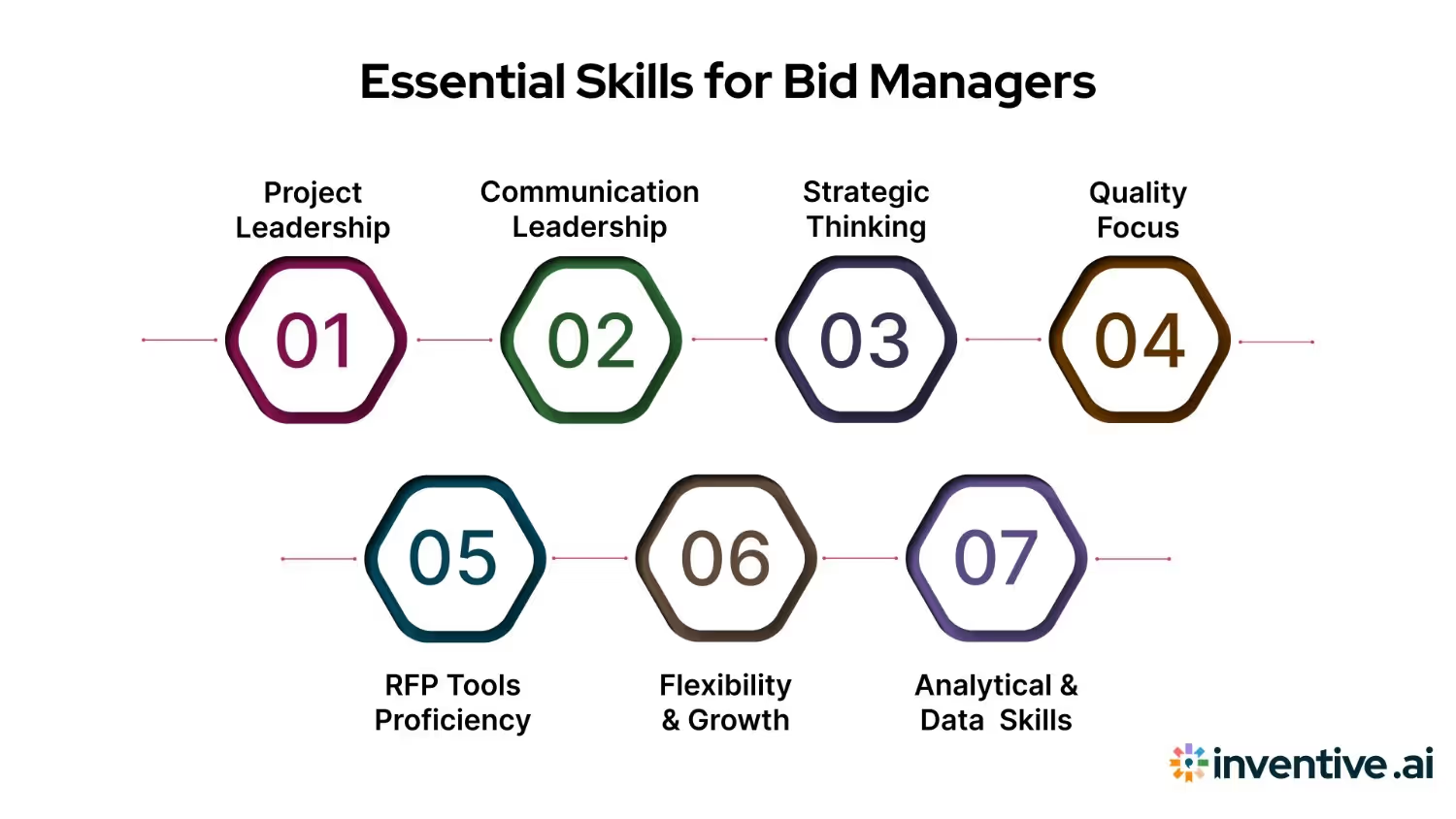Bid Manager Responsibilities and Key Skills Guide for 2026
Learn bid manager responsibilities and skills for constant success. Master project management, detail focus, and strategic coordination to grow your career.

Have you ever lost a bid because your team missed the deadline or sent a weak proposal?
Manual RFP response eats up to 32 hours per response; that’s over a full workweek per opportunity. Such slow turnaround limits your team's ability to chase high-value deals and leaves revenue on the table.
In fact, about 20% of RFPs go unfinished by companies annually, leading to an average revenue loss of $725,000. Bid managers must tackle mounting pressure to deliver quality proposals faster. They juggle tight timelines, scattered content, and competitive pressure, all while ensuring accuracy and consistency. These challenges impact your bottom line and your team’s productivity.
This guide explores the top 10 responsibilities every bid manager must own. It covers the critical skills needed to handle modern bid demands. You’ll also learn how to handle complex RFPs with clear methods and see how to assess content systems and lead your team effectively.
Key Takeaways
- Bid managers plan bids, qualify opportunities, and manage proposal submissions.
- Strong project management, communication, and strategic thinking are essential skills.
- Short turnaround times and complex RFP requirements challenge bid teams daily.
- Managing stale or scattered content affects proposal accuracy and compliance.
- AI-powered RFP tools improve draft speed, content management, and proposal quality.
Who is a Bid Manager?
A bid manager is the leader who guides a company’s proposal efforts from initial opportunity to final submission. In complex sectors, like construction, healthcare, and government contracting, they align cross‑functional teams such as sales, legal, finance, and technical experts.
Effective bid managers boost win rates and control proposal costs. For instance, in capital‑intensive industries, winning bids can cost up to 20% of gross turnover; skilled bid managers help improve win rates from 1‑in‑5 to 1‑in‑2, reducing bid spend and increasing net profit by 10–50%.
In 2026, their role is more strategic than ever. They must balance speed, accuracy, and alignment with company revenue objectives, all under tighter deadlines and higher expectations.
Understanding their core responsibilities will show how they drive growth and create better outcomes for your proposals.
Top 10 Responsibilities of a Bid Manager in 2026

Bid managers today carry far more than coordination duties. Their work shapes how companies win business and grow revenue. In 2026, this role demands strategy, data focus, and clear processes. Strong bid managers don’t just submit proposals; they create bids that stand out and close deals.
Here are their top 10 responsibilities explained in detail:
1. Strategic Bid Planning
It is about deciding how each bid supports business goals. A bid manager must review the RFP’s scope, value, and fit with the services offered. They set clear plans with timelines, resources, and review schedules.
For example, before starting a bid, review your pipeline goals. Does this bid match your revenue targets or strategic sectors? If yes, create a task plan covering kickoff calls, writing phases, SME inputs, and final review timelines. Aligning plans with goals avoids wasted effort on low-value bids. It also sets clear expectations for each team involved.
Planning this way improves your chance to submit stronger, more focused proposals that align with leadership priorities and bring clear ROI.
For more information, check out the blog here: Guide to Writing Government Contract Proposals with AI
2. Opportunity Qualification
These are chances that help bid managers choose which bids to pursue. Reviewing every RFP is a waste if it doesn’t match your strengths. Start by checking client requirements, budget size, and existing relationships.
For instance, if an RFP demands a feature your product lacks and development will take months, it may not be worth bidding. Use a qualification checklist with factors like client fit, competition, delivery capability, and expected profit margins. Talk to sales teams to understand client history and expectations.
A clear qualification process helps your team focus resources on winnable bids, avoiding burnout and reducing proposal costs.
3. Requirements Analysis
Requirements analysis means studying each RFP document in detail. A bid manager must extract key compliance needs, formats, and submission guidelines. Start by reading the full RFP once to grasp its purpose. Then review each section to list mandatory requirements and evaluation criteria.
Note any certificate requirements, technical standards, or document structures mentioned. Share these with your SMEs to align inputs accordingly. Missing compliance points often leads to instant disqualification.
Clear analysis ensures your proposal addresses every requirement, builds trust with evaluators, and avoids last-minute revisions.
4. Win Strategy Development
The strategy builds the foundation for a strong proposal. Bid managers must define why their company is the best choice.
Start by identifying unique offerings, past success stories, or cost benefits relevant to the client. Create “win themes” that show how your solution solves their problem better than others.
For instance, if your software offers faster deployment than competitors, highlight this benefit across executive summaries and solution write-ups. Discuss strategies with sales leads to match client priorities.
A clear win strategy makes your proposal persuasive, structured, and aligned with client goals.
5. Content Management
It ensures your proposals use accurate, updated information. Bid managers maintain content libraries, templates, and approved answers to common questions.
Start by reviewing your content database weekly or monthly to remove outdated data. Tag files with keywords to help SMEs find information faster. For example, store technical specs, security details, and case studies under separate categories. Ensure every document has version control to avoid using old information.
Good content management saves time during proposals, improves accuracy, and builds client trust through consistent messaging.
Do you want to organize, store, update, and reuse approved responses? Check out our detailed blog on “RFP Content Management Tips for Better Responses”
6. Team Coordination & Stakeholder Management
Team coordination is central to a bid manager’s success. They manage SMEs, sales teams, legal advisors, and leadership reviews.
Start by defining each team member’s role and deadline early. Hold short daily check-ins during critical phases to track progress and resolve blockers quickly. Use shared tools to assign tasks and send reminders.
For reference, create a simple dashboard that shows submission timelines and status updates for each section. Clear coordination avoids last-minute rushes, improves content quality, and keeps everyone aligned with submission goals.
7. Proposal Writing & Editing Oversight
Bid managers often review and refine proposal drafts to ensure clarity and persuasiveness. This oversight goes beyond grammar checks. Read each section to ensure it answers client requirements directly and clearly.
Use short sentences, active voice, and simple words to convey value. Replace jargon with practical benefits clients care about. For example, instead of writing “leverages AI capabilities,” say “uses AI to reduce manual work by 80%.”
Editing proposals for clarity and client focus improves evaluation scores and win chances.
Want to learn how AI proposal writing can cut response time by 90%? Read our detailed blog here: How to Use AI for Proposal Writing
8. Risk Assessment
It helps bid managers identify areas that could cause delivery or compliance issues. Review each bid for legal, technical, and financial risks.
For instance, if a client demands 24x7 support but your team operates 8 hours daily, note this as a delivery risk. Discuss with legal teams to review liability clauses or penalty terms. Prepare mitigation plans for high-impact risks and communicate them with leadership.
Proactive risk management avoids contract disputes, delivery failures, and financial losses.
9. Final Review & Submission
Final review is not a formality. Bid managers must check each page for compliance, correct client names, formatting consistency, and document completeness.
Use a checklist for reviewing executive summaries, technical responses, pricing, and appendices. Test file links and table of contents. Confirm submission portals work as expected before deadlines. Early submission avoids portal errors or last-minute system crashes.
Attention to detail in final reviews protects your team’s efforts from being wasted due to small errors.
10. Post-Submission Debrief & Continuous Improvement
After submission, bid managers should analyze both wins and losses. Hold debrief meetings with sales and SMEs to discuss what worked and what did not. Review client feedback for improvement areas. Update your content library with strong proposal sections and fix weak areas.
For reference, if a client rated your solution poorly on security features, collaborate with product teams to strengthen that aspect for future bids. Continuous improvement increases win rates over time and ensures your proposals remain competitive in changing markets.
A skilled bid manager brings structure and focus to complex proposal processes. Understanding these responsibilities builds the foundation for excelling in the key skills needed to shine in this role.
Key Skills and Salary Required for Bid Managers in 2025

Bid managers today manage strategy, content, and people under tight timelines. As RFPs grow complex, having the right skills ensures bids are strong, clear, and submitted on time. Each skill adds value to their work and builds trust with leadership.
According to Indeed, bid managers earn an average salary of $71,661 per year in the US with entry-level roles starting around $44K and top-tier roles reaching up to $117K.
Here are the key skills every bid manager needs in 2025:
1. Strong Project Management Skills
Project management keeps proposal timelines, tasks, and reviews on track. Bid managers often work on multiple bids at once. They must create clear plans, assign tasks, and monitor progress daily. Without strong project skills, deadlines slip, teams get confused, and bids become weak.
For example, using a simple Gantt chart helps visualize tasks and avoid missed steps. Strong project management ensures each proposal section is ready on time, reviewed well, and submitted without errors.
This skill builds team confidence and delivers consistent results.
2. Excellent Communication & Leadership
Bid managers lead teams with diverse skills and roles. They communicate RFP goals, share updates, and resolve blockers. Clear communication avoids confusion over requirements or deadlines. Leadership ensures SMEs and writers stay motivated, aligned, and confident.
For example, holding daily stand-ups during active bids keeps everyone informed. Bid managers also communicate with sales leaders to align win themes with client needs.
Strong communication and leadership keep proposal efforts organized and improve final quality.
3. Strategic Thinking and Commercial Awareness
Strategic thinking helps bid managers plan proposals that win deals, not just respond to questions. They must understand client goals, market trends, and competitor weaknesses. Commercial acumen adds business sense to proposals, aligning bids with company revenue goals.
For instance, choosing to bid on projects with high margins and aligning win themes to client budgets shows commercial focus. This skill ensures bid efforts are worth the time invested and bring better financial outcomes for the business.
Do you know about sections L, M, and C for proposal success? For more information, read our blog here: Understanding Important RFP Sections For Winning Bids
4. Attention to Detail and Quality Focus
Attention to detail ensures proposals meet every client requirement without errors. Missing a small compliance point can disqualify a bid. Quality focus ensures writing is clear, formatting is clean, and all supporting documents are included.
For example, reviewing each page for client name accuracy, numbering, and document references avoids embarrassing mistakes. This skill builds evaluator trust, shows professionalism, and increases win chances in competitive bids.
5. Proficiency in RFP Tools and Automation Platforms
Using AI-powered RFP tools saves time and improves accuracy. Bid managers must know how to use such platforms for content management, response drafting, and reviews.
For example, using an AI RFP agent cuts first draft time by 90%, freeing up hours for strategic inputs. Automation platforms also keep knowledge bases updated and organised. Proficiency in these tools reduces manual effort, avoids stale content, and makes bid processes efficient and scalable.
6. Adaptability and Continuous Learning
Markets, client needs, and proposal standards change often. Bid managers must adapt to new tools, sectors, and compliance updates. Continuous learning keeps their skills sharp and methods modern.
For instance, learning AI proposal writing tools or updated sector compliance rules ensures bids stay competitive. Adaptability helps handle sudden RFP changes, new team members, or updated company strategies without stress.
This skill keeps bid managers relevant and confident in fast-changing markets.
7. Analytical and Data Interpretation Skills
Bid managers must read and analyze RFP data, market trends, and competitor details. Strong analytical skills help them identify what evaluators value most.
For example, reading past bid feedback and win/loss data reveals patterns to improve future proposals. Data interpretation supports better qualification decisions, win strategies, and pricing approaches. This skill ensures each proposal is built on insights rather than assumptions, increasing success rates.
Strong skills shape bid managers into strategic leaders rather than task handlers. Knowing these skills will prepare you to handle bid challenges with confidence and deliver better outcomes for your team and business.
Challenges Faced by Bid Managers Today

Bid managers handle high-pressure work every day. Tight deadlines, complex requirements, and scattered data make their job stressful. As companies demand faster and better proposals, challenges grow stronger. Knowing the problems helps leaders support bid teams with the right tools and processes.
Here are the main challenges bid managers face today:
1. Increasing Complexity of RFPs
RFPs today are longer, with technical, legal, and operational questions across multiple documents. Each section demands inputs from different teams, making it hard to gather accurate responses. This complexity risks errors or missed requirements.
To overcome it, break down RFPs into clear task lists, assign SMEs early, and use checklists for compliance reviews. Regular team catch-ups ensure no section goes unanswered, reducing rework near submission.
2. Shorter Turnaround Times
Clients now expect fast responses, often within days. This pressure forces teams to rush writing and reviews, risking proposal quality. Short timelines also reduce time for creative win strategies.
To manage this, set up draft templates for common responses, keep your content library updated, and hold quick kick-off calls to align teams. Using AI drafting tools can also cut first draft times, giving more room for editing and final reviews.
3. Managing Stale or Scattered Content
Many bid teams store past proposals in different folders or systems. It causes confusion about which version is the latest. Using old or wrong content risks compliance failures and credibility loss.
To avoid this, maintain a central content library with version controls. Review and update key sections monthly. Tag documents by sector, product, and client type to help SMEs find answers quickly and keep proposals fresh and accurate.
4. Ensuring Consistent Messaging Across Proposals
When different writers draft different sections, messaging often loses consistency. Tone, brand voice, and value propositions may vary, creating a weak impact. This affects evaluator confidence and brand strength.
To fix this, set style guides and approved win themes for all writers. Review final drafts for consistency in tone, benefits, and language before submission. It ensures your proposals read as one clear, confident voice.
5. Balancing Multiple Bids Simultaneously
Bid managers often handle several bids at once, each with its own deadlines and teams. It creates workload stress and increases the risk of missing key tasks.
To manage this, prioritize bids based on revenue impact and qualification scores. Use simple project dashboards to track tasks and deadlines for each bid. Delegating writing tasks to SMEs and using automation tools for repetitive work can reduce personal workload and improve focus.
Bid managers face daily hurdles that can slow down revenue goals. Knowing these challenges shows why they need modern tools and clear processes to succeed. Now, let’s discuss how Inventive AI can help bid managers overcome stress and excel in their field.
How Inventive AI Transforms Bid Management for Faster Wins?
Inventive AI is an advanced AI-powered RFP Response, Automation, and Management platform. It simplifies and speeds up the process of responding to complex RFPs. It serves bid managers, proposal teams, sales teams, and revenue leaders who need to draft accurate responses quickly and manage content efficiently.
Bid managers often ask – How does Inventive AI solve daily bid challenges? Here’s how:
- Creates Drafts 10x Faster: Uses its proprietary AI system to draft responses ten times faster. It reduces writing time and gives bid managers quick drafts to refine, improving turnaround speed.
- Acts as a Single Hub for Knowledge: Stores all knowledge sources in one place. You can upload past RFPs, integrate Google Drive or SharePoint, and manage Q&A sheets easily. It keeps content organized and accessible.
- Fights Stale Content with AI Content Manager: Flags outdated or conflicting content within your knowledge base. It ensures only the most accurate and relevant information goes into proposals, avoiding compliance risks.
- Uses Win Themes for Higher Conversion: Identifies gaps in RFP responses and fills them using insights from Slack, emails, and call notes. It improves proposal quality and increases chances of winning deals.
- Enhances Productivity with AI Agents: Offers AI agents that help with competitor research, idea generation, and drafting support. It gives bid managers a strong competitive edge and improves team efficiency.
Inventive AI reduces RFP response times by 90%, improving throughput and win rates by over 50%. It gives bid managers the confidence to handle more bids with better quality and win outcomes.
Conclusion
Bid managers in 2025 carry evolving responsibilities that go beyond coordination. They plan strategic bids, qualify opportunities, analyze requirements, build winning strategies, and manage complex teams. Their skill sets now include project management, strategic thinking, data analysis, and adaptability to handle rising proposal demands with confidence.
AI RFP Automation encourages bid managers to focus on what matters most, developing strategic win themes and building strong client relationships. By removing manual drafting work and managing content effectively, they can submit high-quality, accurate responses faster.
With AI RFP Agents and AI-powered RFP response software, bid managers achieve better proposal throughput and win rates. Inventive AI transforms how teams respond to RFPs with its advanced AI RFP Automation features built for modern bid needs.
Want to see how Inventive AI’s AI RFP Agent can transform your bid process? Book a call today to experience AI-powered RFP response software and automation tools.
Frequently Asked Questions
1. What is the role of a Bid Manager?
A bid manager oversees the entire RFP response process. They plan bids, analyze requirements, create win strategies, manage teams, and ensure proposals are submitted on time. Their role ensures proposals align with business goals and increase the chances of winning new deals.
2. What skills are needed to be a successful Bid Manager in 2025?
Key skills include strong project management, strategic thinking, commercial awareness, clear communication, attention to detail, adaptability, and proficiency in AI RFP tools. These skills help bid managers handle complex proposals, meet tight deadlines, and improve win rates confidently.
3. How does AI help Bid Managers improve proposal outcomes?
AI-powered RFP response software drafts responses faster, manages content in one place, flags stale information, and supports win theme development. It reduces manual work and improves proposal quality, accuracy, and submission speed, allowing bid managers to focus on strategic tasks.
4. What industries hire Bid Managers the most?
Bid managers are in high demand across construction, technology, healthcare, finance, and government contracting sectors. These industries rely on complex RFPs to win projects and need skilled professionals to handle proposals efficiently and increase business revenue.
5. How is Inventive AI different from traditional RFP tools?
Inventive AI uses AI RFP Agents to create drafts 10x faster, manage all knowledge sources in one hub, flag outdated content, and build win themes. Unlike traditional tools, it focuses on automation and accuracy to improve proposal outcomes and team productivity.

90% Faster RFPs. 50% More Wins. Watch a 2-Minute Demo.
Tired of watching deal cycles stall due to manual questionnaire back-and-forth, Dhiren co-founded Inventive AI to turn the RFP process from a bottleneck into a revenue accelerator. With a track record of scaling enterprise startups to successful acquisition, he combines strategic sales experience with AI innovation to help revenue teams close deals 10x faster.
After witnessing the gap between generic AI models and the high precision required for business proposals, Gaurav co-founded Inventive AI to bring true intelligence to the RFP process. An IIT Roorkee graduate with deep expertise in building Large Language Models (LLMs), he focuses on ensuring product teams spend less time on repetitive technical questionnaires and more time on innovation.


